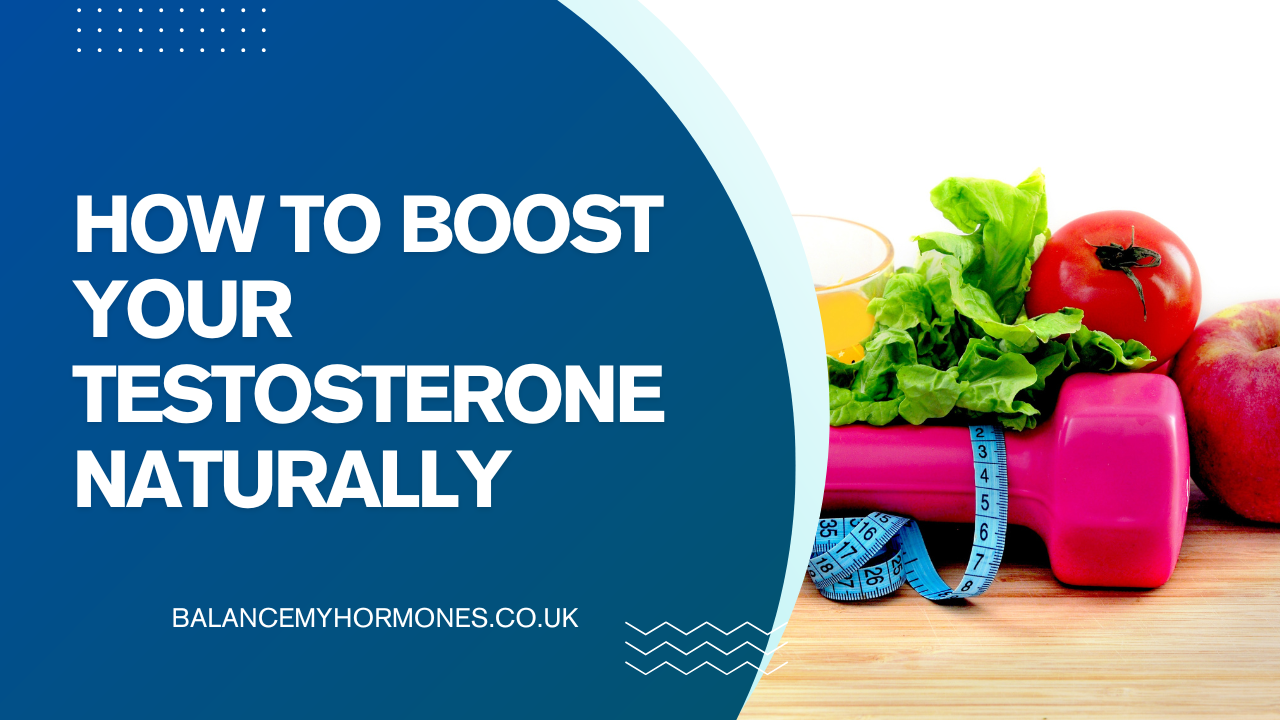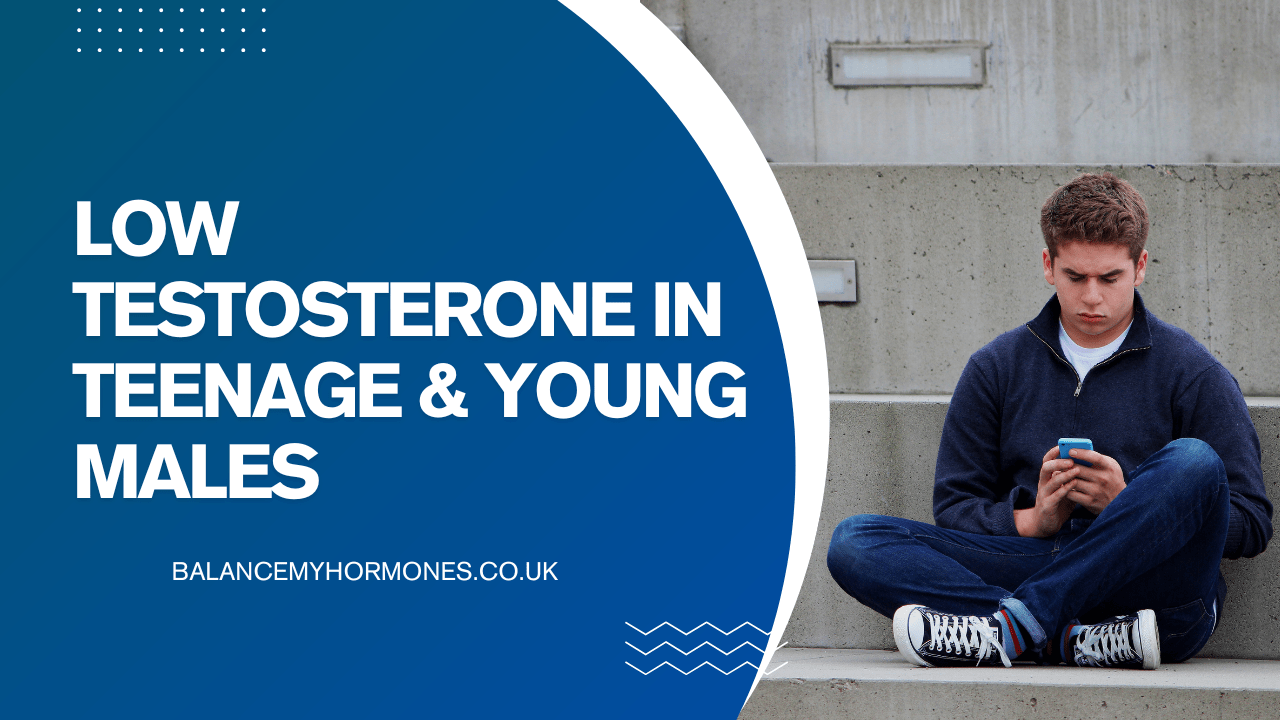
By Mike Kocsis | 10 minutes read | Last updated: August 17, 2025 Categories: Hormone imbalance Nutrition & diet Testosterone
Medically Reviewed by Dr. George Touliatos
Testosterone is an important hormone responsible for several bodily functions and overall health. Men produce testosterone in the testicles and by the adrenal glands.
Not only is testosterone important for the day-to-day function of a man, but it is also the driving force in puberty and sexual development.
It’s responsible for increasing muscle mass, developing the voice, body hair growth and much more.
Your natural testosterone levels can fluctuate for numerous reasons. The good news is that there are some natural methods and medical treatments available today that can help you bring your declining testosterone levels back to normal.
If you’re looking for ways to increase or maintain healthy testosterone levels, read on and find out what steps you can take to boost low testosterone naturally.
How to increase testosterone naturally?
Before considering medication or hormone replacement therapy (HRT), it’s worth exploring natural testosterone boosters that can support and improve your testosterone levels.
These methods not only offer a more holistic approach but also help you gain a deeper understanding of how testosterone affects your overall health.
By focusing on simple lifestyle changes, you can boost testosterone levels naturally, protect your long-term wellbeing, and avoid the need for costly treatments like testosterone replacement therapy (TRT).
Here are the most effective natural methods that can help increase your testosterone:
Physical activity, exercise and weight lifting
Physical activity is one of the most important determining factors and methods for raising testosterone in the body. This can range from simply exercising to lifting weights and building muscle.
People know physical activity is important for their overall health, but it’s also vital in the production of testosterone and in maintaining testosterone levels.
There have been several studies to suggest that those who exercise regularly also experience higher testosterone levels than people who don’t exercise as much.
This has been shown to be true across all age groups, especially the elderly. In studies that involved elderly people, more exercise was shown to increase reaction time and fitness as well as the level of testosterone.
One of the most effective types of exercise is high-intensity interval training (HIIT). This is a specialised type of training known to have a particularly high impact on the levels of testosterone in the body.
Watch your diet
Having a poor diet can negatively affect testosterone levels.
If you’re trying to support testosterone levels naturally, one of the first things to evaluate is your diet, specifically your daily calorie intake and nutrient quality.
Being mindful of what you eat can significantly support healthy hormone production and help raise your T levels.
Maintain a healthy, balanced diet consisting of a balanced portion of protein, carbohydrates and healthy fats.
Protein
Eating enough protein is important for boosting testosterone because it helps regulate key hormones involved in its production.
Carbohydrates
Carbs are responsible for a number of health factors within the body and research has shown that they are also vital in improving testosterone levels.
Carbs are most effective when you take them in moderation and combine them with strength/resistance training.
Fats
Your body needs dietary fat to support hormone synthesis, and low-fat diets have actually been linked to lower testosterone levels.
Testosterone superfoods
Testosterone superfoods are known to be rich in magnesium, zinc, vitamin D, omega-3 fatty acids and other essential nutrients. They may help increase testosterone by supporting an overall hormone balance.
Some examples of the best testosterone superfoods are:
- Extra virgin olive oil
- Spinach
- Garlic
- Onion
- Beef
- Green tea
- Oysters
- Pomegranate
- Egg
- Oily fish
Enjoy the outdoors
Vitamin D, which your body naturally produces when exposed to sunlight, is essential for many functions, including testosterone production.
Despite its importance, many people have a vitamin D deficiency, which could be contributing to low testosterone levels and other health issues.
To boost your vitamin D, you have two main options: take a high-quality supplement or spend more time outdoors in direct sunlight. Many people choose the latter since your body absorbs vitamin D most effectively this way.
Get good quality sleep
In recent years, it’s come to light how important it is to have enough sleep.
Many people now know the vast benefits that come with getting high-quality sleep, but not many know that it can improve their testosterone levels and hormonal health.
One study in particular found that those getting only 5 hours of sleep a night averaged a 15% reduction in the level of testosterone available to the body.
During deep sleep, the body releases hormones necessary for testosterone production. Prioritising good sleep hygiene can therefore play a significant role in supporting hormonal health and maintaining testosterone levels.
You should pay close attention to the quality of your sleep as well as the amount of sleep that you are getting if you want to have healthy hormone levels in your body.
Learn to manage stress
Stress has been known to lower the amount of testosterone in the body and have adverse health effects.
One of the main hormones associated with stress is cortisol. When you have chronic stress, you will also have high cortisol levels.
When your hormones are out of balance, it often impacts more than just one hormone. This is especially true with the hormone cortisol.
When cortisol levels are consistently high due to chronic stress, they can suppress healthy testosterone production, leading to lower levels and potential health issues.
Elevated cortisol levels can increase hunger, lead to weight gain, and promote the buildup of visceral fat (fat stored around vital organs), which can further disrupt testosterone balance.
To counteract the impact of stress and high cortisol levels, it’s important to actively manage stress in your daily life.
Incorporating regular exercise, getting enough quality sleep, making time for laughter and enjoyable activities, and striving for a healthier work-life balance can all help regulate cortisol and support hormonal harmony.
Control your alcohol consumption
Excessive alcohol consumption is linked to low testosterone levels as it leads to the conversion of testosterone into estrogen (a female sex hormone).
Studies show that drinking alcohol consistently for 5 days can lower your testosterone.
A 2022 research concludes that “the risk of testosterone deficiency increases in heavy drinkers (>8 drinks per week) who flush compared to that in non-drinkers.”
Maintain a healthy body weight
An increase in body weight (excess body fat) tends to cause low testosterone in men. Fat cells have the enzyme aromatase that converts testosterone into estrogen, leading to a hormonal imbalance.
What’s more, weight gain increases the risk of cardiovascular diseases and type 2 diabetes, both of which also contribute to low T in men.
The good news is that you can raise your testosterone levels by losing weight. Data reveal that even 5% weight loss can result in a 2 nmol/L testosterone increase.
So, try different effective weight loss methods to reduce or maintain a healthy weight and see your testosterone boost naturally.
Consider dietary or natural supplements to increase testosterone
Nutritional supplements can also be effective in boosting testosterone naturally in men.
According to some studies, zinc supplements may help men with low zinc levels improve their fertility as well as testosterone levels.
Other natural supplements that may be helpful in this regard include:
- Ginger
- Ashwagandha
- Grape seed extract
- Quercetin
Choose glass over plastic
Plastic and packaging materials contain hormone disruptors like Bisphenol A (BPA) that can reduce your testosterone levels.
A Chinese study shows that men who worked around BPA for 6 months had lower testosterone levels than those who did not.
So, replace your plastic utensils with glass, stainless steel or ceramic alternatives to minimise BPA exposure.
What are the benefits of increasing testosterone?
Testosterone is a primary male sex hormone that is involved in various functions in the body.
Both men and women need healthy testosterone levels to enjoy a healthy mental, emotional, physical and sexual life.
Low testosterone can lead to several unwanted side effects, including low muscle mass, loss of bone mineral density, low sex drive and mood swings. However, these symptoms can be relieved by increasing testosterone levels.
Here is a list of common benefits of maximising testosterone:
- Better mood, energy levels and motivation
- Improved sexual function, libido and erectile function
- Enhanced bone mineral density and low risk of bone fractures
- Gain in muscle mass and strength
- Reduced body fat and body weight
- Enhanced cognitive function and mental well-being
How to tell if you have low testosterone?
Low testosterone presents itself through symptoms like low energy, reduced muscle mass, erectile dysfunction, mood changes and trouble concentrating. If you experience one or more of these symptoms of low testosterone, you may have low T.
You can confirm your testosterone levels via a blood test that measures your serum testosterone levels. Generally, a total testosterone level below 8 nmol/L or 300 ng/dL is considered low.
Get yourself checked by an endocrinologist if you are concerned about your free testosterone levels. They can help you diagnose hormonal issues and provide suitable treatments.
Contact our experienced team today to discuss your health concerns, get a testosterone test or talk to a doctor.
Other ways to increase testosterone
Natural methods to boost testosterone are effective but they do not always generate results, especially if your T levels are way too low.
In such cases, treatments like testosterone replacement therapy (TRT) come to help.
TRT involves taking synthetic testosterone to increase your serum testosterone levels artificially. You can take testosterone in various forms, including injections, topical creams or gels, skin patches, and more.
TRT has helped countless low T men improve the quality of their lives and overall health. But this treatment is not for all, as TRT has its own side effects.
That is why TRT specialists evaluate each case carefully before deciding whether an individual is the right TRT candidate or not. Generally, men with a history of prostate cancer, breast cancer, severe sleep apnea, high red blood cell count and heart issues are told to avoid TRT.
FAQs about natural testosterone boosters
Do cold showers boost testosterone?
Some people believe that cold showers can help them boost testosterone, but the truth is, science does not prove this claim. In fact, according to some studies, cold showers could negatively impact testosterone levels.
Does magnesium raise testosterone?
Yes, magnesium can increase your testosterone, especially if you are magnesium-deficient. It does this by supporting testosterone production.
Does fenugreek increase testosterone?
Fenugreek supplements may help increase testosterone production and tackle low T symptoms. Several studies also show its effectiveness in this regard.
Does cardio increase testosterone?
Studies show no connection between cardio and testosterone levels. In contrast, strength or resistance training can be effective in restoring low testosterone.
Summing it up
Testosterone deficiency is one of the most common problems that men and others face on a daily basis.
While many believe that the only way to overcome this is with expensive and sometimes dangerous medications, there are many free, natural ways to treat low testosterone.
Although these natural methods and healthy lifestyle habits can help boost your testosterone levels, sometimes it’s not quite enough.
If you’re concerned you may have testosterone levels that cannot be treated naturally, get in contact with us, where we can book you in for a FREE consultation and assess your symptoms.
References
Okobi, O.E., Khoury, P., Raul, J., Figueroa, R.S., Desai, D., Mangiliman, B.D.A., Colon, O.L.V., Urruela-Barrios, R.J., Abdussalam, A.K., Diaz-Miret, M. and Borges, S.H., 2024. Impact of weight loss on testosterone levels: a review of BMI and testosterone. Cureus, 16(12).
Koh, K., Kim, S.S., Kim, J.S., Jung, J.G., Yoon, S.J., Suh, W.Y., Kim, H.G. and Kim, N., 2022. Relationship between alcohol consumption and testosterone deficiency according to facial flushes among middle-aged and older Korean men. Korean journal of family medicine, 43(6), p.381.
Green, D.J., Chasland, L.C., Yeap, B.B. and Naylor, L.H., 2024. Comparing the impacts of testosterone and exercise on lean body mass, strength and aerobic fitness in aging men. Sports Medicine-Open, 10(1), p.30.
Ryu, D.Y., Pang, W.K., Adegoke, E.O., Rahman, M.S., Park, Y.J. and Pang, M.G., 2023. Bisphenol-A disturbs hormonal levels and testis mitochondrial activity, reducing male fertility. Human reproduction open, 2023(4), p.hoad044.
Evidence Based Research
This article has been researched and written based on scientific evidence and fact sheets that have then been crossed checked by our team of doctors and subject matter experts.
References, sources and studies used alongside our own in-house research have been cited below, most of which contain external clickable links to reviewed scientific paper that contain date stamped evidence.
Our team of healthcare experts and GMC registered doctors are licensed to UK GMC standards. We strive to provide you with the latest evidence based, researched articles that are unbiased, honest and provide you with accurate insights, statistics and helpful information on the discussed topic to ensure you gain a better understanding of the subject. You can read more about our Editorial Process by clicking here.
We value your feedback on our articles, if you have a well-researched paper you would like to share with us please contact us.
Quick Low Testosterone Test
If you know your total testosterone reading from a previous blood test input the results to the left above to see if your testosterone levels are normal.
Low Testosterone Levels
You may have low testosterone depending on the symptoms you have, please contact us to find out how we can help.
Please Retry
The Total Testosterone Level You Entered Is Incorrect. Figure Must be in nmol/L you can use our converter here.
Normal Testosterone Levels
Your testosterone levels appear to be in the normal range.
LOOKING GOOD!
You must be over 38, have had your ovaries removed or have suffered with premature menopause to warrant further hormone tests.
Further investigation needed
Please contact us to discuss your hormones, we need your total testosterone levels to validate your hormone deficiency. You can order a blood test here.
Low Testosterone Levels
You may have low testosterone depending on the symptoms you have, please contact us to find out how we can help.
High Testosterone Levels
You appear to have higher than normal testosterone levels, please contact us for further investigation.
Normal Testosterone Levels
You appear to have normal testosterone levels. Contact us if you have any concerns.


 Mike Kocsis has an MBA with a focus on healthcare administration and is an entrepreneur and medical case manager for Balance My Hormones which offers medical services in the UK and Europe. Mike has over 20 years of experience in the healthcare sector, much of that working with people who have hormone imbalances. Mike has appeared on
Mike Kocsis has an MBA with a focus on healthcare administration and is an entrepreneur and medical case manager for Balance My Hormones which offers medical services in the UK and Europe. Mike has over 20 years of experience in the healthcare sector, much of that working with people who have hormone imbalances. Mike has appeared on 

